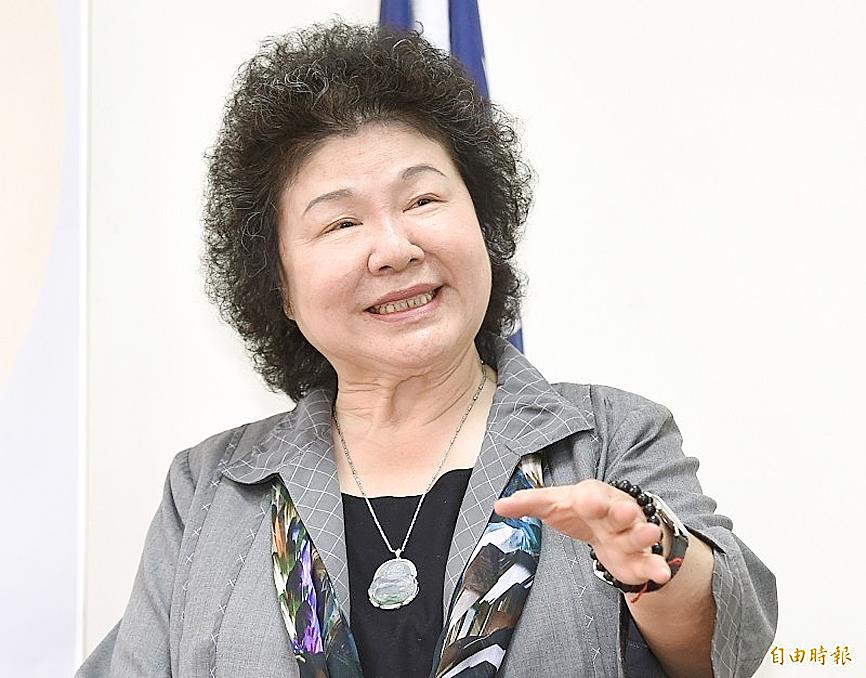Former Presidential Office secretary-general Chen Chu (陳菊) would likely focus her energy on running the new National Human Rights Committee when she takes over as Control Yuan president, another incoming member of the government watchdog said.
The source, who requested anonymity, said that the smooth transition of the Control Yuan’s powers to investigate, censure and audit should be ensured.
Chen has repeatedly said that she hoped to be the last Control Yuan president, amid calls for the watchdog to be abolished, although she has also said that she would perform all the duties that come with the title to the best of her ability.

Photo: Lee Hsin-fang, Taipei Times
President Tsai Ing-wen’s (蔡英文) administration last week said it would push for a constitutional amendment to abolish the Control Yuan and the Examination Yuan in the next legislative session that starts in September.
The legislature on Dec. 10 last year passed the Organic Act of the National Human Rights Committee (國家人權委員會組織法), paving the way for the establishment of a 10-member committee.
The new committee is different from the Control Yuan’s other seven standing committees, because it would be based on teamwork, rather than individual investigation, a Control Yuan member said on condition of anonymity.
Control Yuan members lead independent investigations before convening other members and presenting their results, after which those convened vote on whether to issue an impeachment, recall of officials or a corrective notice, the source said.
Such statements do not carry much weight, as they are attributed to the Control Yuan member or members who led the investigation, unless other members back the motion, the source said.
However, a Control Yuan member, or a member of the National Human Rights Committee’s standing committee can propose an issue that would be debated and rigorously reviewed before the rights committee decides to accept the case.
The Human Rights Committee is to have 10 members, including the Control Yuan president. Aside from Chen, seven more members have been confirmed, with the final two to be appointed from among current Control Yuan members.
Another member, also citing anonymity, said that should the constitutional amendment pass, incoming Control Yuan members must recognize they would be the last of a sunset organization.
They would leave their posts after overseeing a transition of power, another source said.
The second source said that it is of utmost importance that the incoming members ensure that the Human Rights Committee becomes an independent agency if the Control Yuan is abolished.
Whether the Legislative Yuan would assume the mantle of exercising the power of control of the Control Yuan and then adopt a bicameral system is still up for debate, the second source said.
The terms of the current Control Yuan members end on Friday, with the new members to assume their posts the following day.

A Taiwanese software developer has created a generative artificial intelligence (AI) model to help people use AI without exposing sensitive data, project head Huang Chung-hsiao (黃崇校) said yesterday. Huang, a 55-year-old coder leading a US-based team, said that concerns over data privacy and security in popular generative AIs such as ChatGPT and DeepSeek motivated him to develop a personal AI assistant named “Mei.” One of the biggest security flaws with cloud-based algorithms is that users are required to hand over personal information to access the service, giving developers the opportunity to mine user data, he said. For this reason, many government agencies and

The National Fire Agency on Thursday said a series of drills simulating a magnitude 8.5 earthquake would be held in September to enhance the government’s emergency response capabilities. Since earthquakes cannot be predicted, only by continuously promoting disaster prevention measures could Taiwan enhance its resilience to earthquakes, agency Director-General Hsiao Huan-chang (蕭煥章) said in a news release. The exercises would be held to mark annual National Disaster Prevention Day on Sept. 21, the aim of which is to test Taiwan’s preparedness and improve its earthquake resilience in case of a major temblor, Hsiao said. As part of those drills, an earthquake alert would

DEFENSE: The National Security Bureau promised to expand communication and intelligence cooperation with global partners and enhance its strategic analytical skills China has not only increased military exercises and “gray zone” tactics against Taiwan this year, but also continues to recruit military personnel for espionage, the National Security Bureau (NSB) said yesterday in a report to the Legislative Yuan. The bureau submitted the report ahead of NSB Director-General Tsai Ming-yen’s (蔡明彥) appearance before the Foreign and National Defense Committee today. Last year, the Chinese People’s Liberation Army (PLA) conducted “Joint Sword-2024A and B” military exercises targeting Taiwan and carried out 40 combat readiness patrols, the bureau said. In addition, Chinese military aircraft entered Taiwan’s airspace 3,070 times last year, up about

STRICTER ENFORCEMENT: Taipei authorities warned against drunk cycling after a sharp rise in riding under the influence, urging greater public awareness of its illegality Taipei authorities have issued a public warning urging people not to ride bicycles after consuming alcohol, following a sharp rise in riding under the influence (DUI) cases involving bicycles. Five hundred and seven people were charged with DUI last year while riding YouBikes, personal bicycles, or other self-propelled two-wheelers — a fourfold increase from the previous year, data released by the Taipei Police Department’s Traffic Division showed. Of these, 33 cases were considered severe enough to be prosecuted under “offenses against public safety,” the data showed. Under the Road Traffic Management and Penalty Act (道路交通管理處罰條例), bicycles — including YouBikes and other